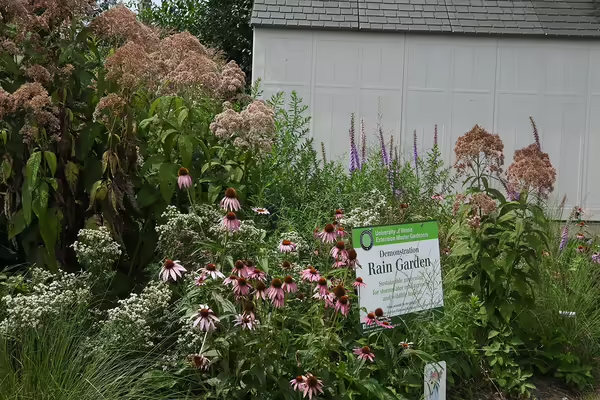
SYCAMORE, Ill.— Naturalists and gardeners, homeowners, conservation organizations, stormwater professionals, and landscape consultants are examples of those who can learn how landscape design and management practices reduce pollution from stormwater runoff at a workshop hosted by University of Illinois Extension. The workshop, a joint effort of Illinois Extension and Purdue Extension, is offered over two consecutive Tuesdays in October. The program begins on October 14, with the second session on October 21. Both sessions will be held at the DeKalb County Farm Bureau, 1350 W. Prairie Drive, Sycamore, from 8:30 a.m. to noon.
Rainscaping your property helps it capture stormwater more effectively, allowing it to be released slowly and infiltrate into the ground with less runoff. Stormwater runoff from our homes and communities can carry pollutants directly to rivers, lakes, streams, and eventually into our drinking water.
The Illinois/Purdue Rainscaping Education Program covers multiple rainfall management practices and educates participants on how to promote community awareness for these important practices. Over the course of the program, attendees will learn how to site, design, construct, and maintain a rain garden.
The two-day program fee is $50. Registration is limited and will close on October 7 or earlier if available spaces fill. To register, visit https://go.illinois.edu/DeKalbRainscaping.
Contact the DeKalb County Extension Office with questions or if you need a reasonable accommodation to participate in programming at 815-758-8194 or cahandel@illinois.edu.
University of Illinois Extension develops educational programs, extends knowledge, and builds partnerships to support people, communities, and their environments as part of the state's land-grant institution. Extension serves as the leading public outreach effort for University of Illinois Urbana-Champaign and the College of Agricultural, Consumer and Environmental Sciences in all 102 Illinois counties through a network of 27 multi-county units and over 700 staff statewide. Extension’s mission is responsive to eight strategic priorities — community, economy, environment, food and agriculture, health, partnerships, technology and discovery, and workforce excellence — that are served through six program areas — 4-H youth development, agriculture and agribusiness, community and economic development, family and consumer science, integrated health disparities, and natural resources, environment, and energy.